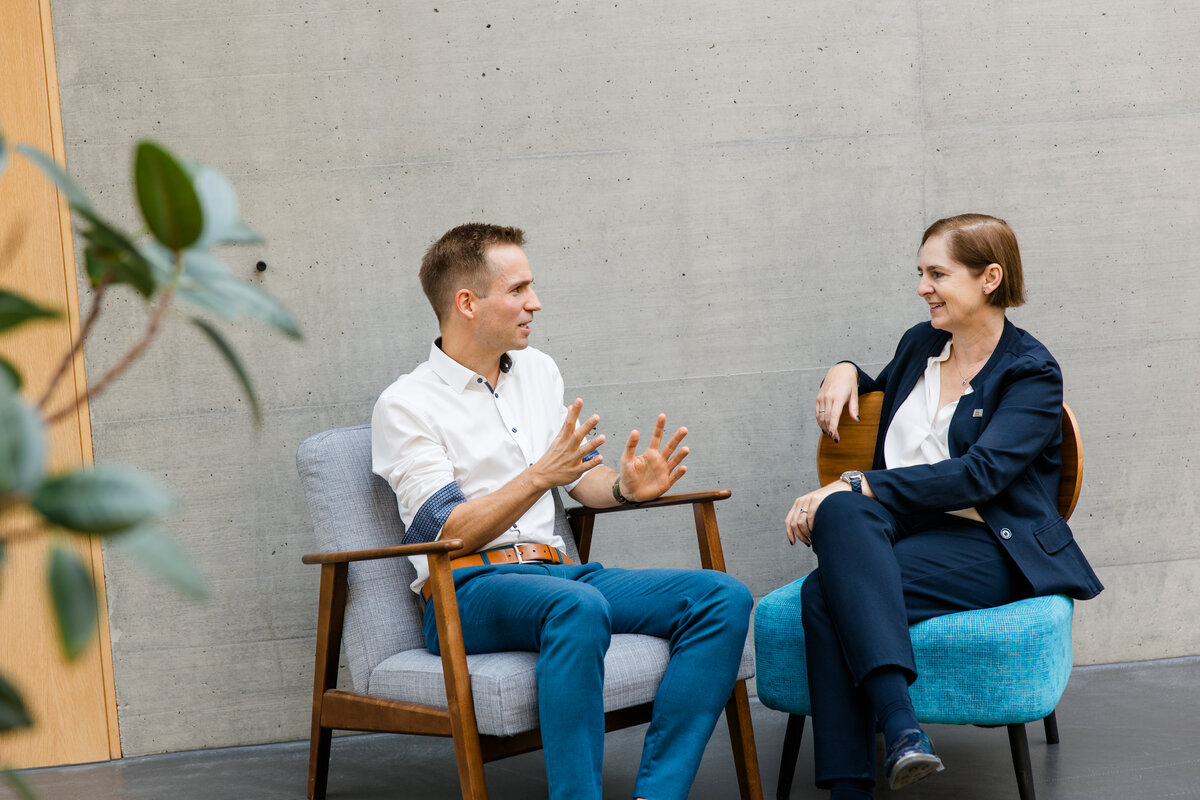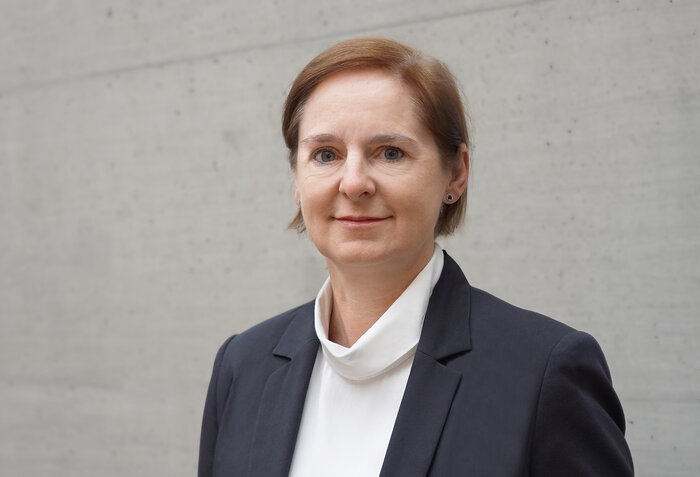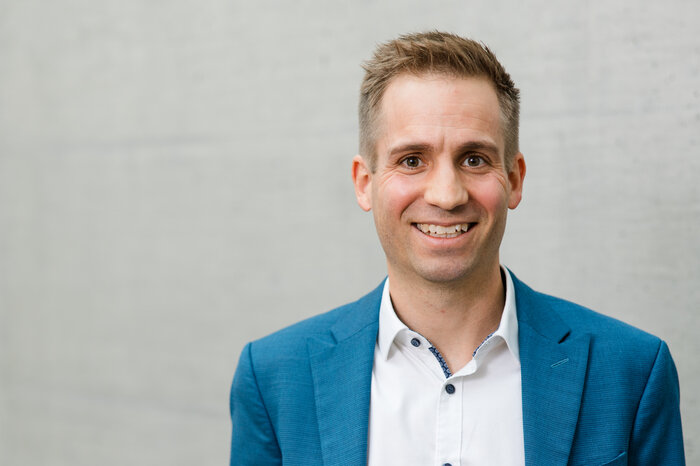Research director Markus Preißinger in conversation with rector Regine Kadgien
(Issue 1 / 2025) What do the Rectorate and Research at FHV have in common? Regine Kadgien and Markus Preißinger focus on communication – not just as a tool, but as a key competence for the success of our university of applied sciences in the Lake Constance region and beyond.

Markus, you have been leading research at FHV since January 2022. You are now entering your fourth year as head of research. Regine, you took over as rector in October and already have experience as vice-rector. Your meeting for the research newsletter is a first: the start of our series ‘Research in Dialogue’.
Let's get right to it: where do your topics overlap? Where does research management meet the university's strategy?
Regine: It's about enabling our teachers to do research. Many young researchers support teaching. Many of the teachers are involved in research. It is important that researchers are also part of the development teams that drive our degree programmes forward. One of the six positions on the faculty is reserved for research.
Markus: The links between research and teaching are enshrined in law. However, the FHV lives this connection to a far greater extent than is required by law. We live it in both directions: from research to teaching and vice versa. This has enabled us to establish ourselves as a research-strong university.
Regine: Being research-intensive also means added value for students: by integrating research into teaching, they come into contact with research at an earlier stage.
Keyword: internationality. What does cooperation look like here?
Markus: With our project partners in international R&D projects, we often open doors for our regional partners: companies, institutions or businesses. We have international researchers who are also involved in teaching and give courses in English; we have international students and international lecturers – every degree programme has an international semester.
Regine: We make this possible through our funding programmes: there are student exchanges, teaching staff exchanges and researcher exchanges, for example with RUN-EU partner universities. In addition, our International Office has been active in this area for many years. RUN-EU is now strengthening this exchange with institutionalised partners: together, we develop and implement research projects and courses.
Markus: We would never have become a RUN-EU partner if our International Office hadn't already done such excellent work in previous years and established networks in the EU and worldwide.
Regine: Our goal is to offer all students international experience, for example in the form of short-term experiences or study trips.
What is your opinion on the demand for universities of applied sciences to be granted the right to award doctorates?
Regine: Internationally speaking, there are universities of applied sciences with the right to award doctorates, particularly in the RUN-EU network. Research-intensive universities in particular depend on the possibility of pursuing a doctorate. The benchmark here should be the international state of the art.
Markus: The aim is to attract the best minds. It therefore makes no sense to differentiate between universities and universities of applied sciences in advance. This has been accepted in Bavaria. We want to be able to offer quality-assured, accredited programmes – comparable to universities, which are already able to do so due to their status.
Regine: Private universities also have the right to award doctorates. In my view, there is no longer any reason why we should not be allowed to certify.
Markus: We want to be able to recognise what we have always done – namely, excellent applied research – by awarding doctoral degrees. The Austrian University of Applied Sciences Conference (FHK) has been calling for this right for years, and the FHV supports it as its representative in this important debate.
Why do we still need fundamentals in bachelor's programmes, but why is specialisation necessary in master's programmes? How do you respond to that?
Markus: Fundamentals are important in bachelor's programmes because the world out there is changing at an extreme pace. With a good foundation, you can adapt and then specialise in your master's programme.
Regine: In recent years, very specialised niche BA programmes have emerged on the market. That is exactly what we do not want. We still need the necessary fundamentals.
Markus: To illustrate: if I didn't understand maths and thermodynamics in my bachelor's degree, then I can't optimise an energy system in my master's degree. A solid methodological education is essential.
Regine: But that doesn't mean that the bachelor's programme is boring. It's very project-oriented. It's about content and applications. So it's not important to list ten points, but rather, to stick with the example, students need to know how thermodynamics works: understanding instead of memorisation.
That brings us to ‘future skills.’ Please tell us more about that.
Regine: Last year, we formed a working group to discuss what skills students should have beyond pure subject knowledge. We identified a total of 16 skills in the following four areas: Professional Mastery (applied subject knowledge), Academic Attitude (critical thinking and analytical work), Awareness (reflection and conscious work – ethics & sustainability) and Social Skills (acting and working together – communication). The aim is for our students to learn something about all 16 skills and understand what the terms mean.
Markus: Twenty years ago, the focus was very much on the first area – Professional Mastery. Today, in order to advance our region, the business location of Vorarlberg, it is important that we support students in all four areas. This means that we want to firmly anchor ‘future skills’ in both our degree programmes and our research projects.
What strengths do you bring to bear in presenting the research and teaching of the FHV in its full glory and making it successful both regionally and internationally?
Markus: I see my strength in storytelling, in explaining to companies and partners exactly what we do and what impact we have. Both externally and internally, I see myself as a kind of translator and mediator who can inspire students and colleagues with applied research. For example, I head the RUN-EU Research Expert Network, and here, too, the aim is to mediate between different cultures and types of universities in order to jointly get research projects off the ground.
Regine: I see myself as the one who helps to create the framework conditions that teachers and researchers need. We will update our programmes and make our bachelor's and master's degrees future-proof. For example, we have a strategy to integrate 30% blended learning: the aim here is to redesign the way we teach. We will certainly not become an online university. Rather, it is about exchange and reflection.
Markus: We have excellent programme directors and heads of our research centres and research groups, so I see our job primarily as keeping an eye on the big picture: the stakeholders, so that we can work together to shape the future in a meaningful way.
Communication as a key competence – with this powerful resource at your disposal, where can cooperation between research and teaching take you, and what priorities do you want to set?
Markus: Anyone interested in studying in Vorarlberg should have the FHV as their first point of contact. And everyone involved in R&D should also know that we are their first point of contact. So we want to boost awareness among the general public once again.
Regine: Our third mission gives us a strong impetus to go out and show what we can do in an even more targeted way – in both teaching and research. We want to become even more involved in the discussion, for example with initiatives such as the Long Night of Research.
Markus: The whole community in Vorarlberg should see what the FHV does and what impact it has. Especially at a time when scientific findings are increasingly being questioned and controversially discussed, we want to be a guarantee for sound knowledge and scientific integrity.
Do you have a common message?
Regine looks around the room: Yes, research and teaching go hand in hand here: you can't have one without the other.
About the individuals:
Regine Kadgien comes from Vorarlberg and studied telematics at Graz University of Technology, where she earned her doctorate in technical sciences with honours in 2001. She began her career in 2002, initially as a university lecturer in computer science at FHV. From 2003, she was also head of the computer science programme, and since 2022 she has been head of the Informatics competence field in the Technology department. Regine has been a member of the FHV faculty for many years. From 2006 to 2011, she held the position of vice-rector at the FHV. In 2022, she was awarded the Grand Decoration of Honour by the state of Vorarlberg for her services in inspiring enthusiasm for technology and computer science among young people. Since October 2024, Regine has headed the FHV faculty as FHV Rector.
Markus Preißinger was born in Allgäu. After graduating from high school, he spent a year in Australia and New Zealand before being drawn to the University of Bayreuth, where he spent 13 years studying, completing his doctorate, doing postdoctoral research and establishing the Centre for Energy Technology as its managing director. In August 2017, Markus moved to FHV as illwerke vkw Endowed Professor for Energy Efficiency and Head of the Energy Research Centre. This was followed by his appointment as Head of the Josef Ressel Centre for Intelligent Thermal Energy Systems and Head of Research. Since July 2024, Markus has been authorised signatory of the FHV and head of research. He also heads the Research Expert Network at the European University RUN-EU.
If you are interested, you are welcome to contact Regine and Markus.

